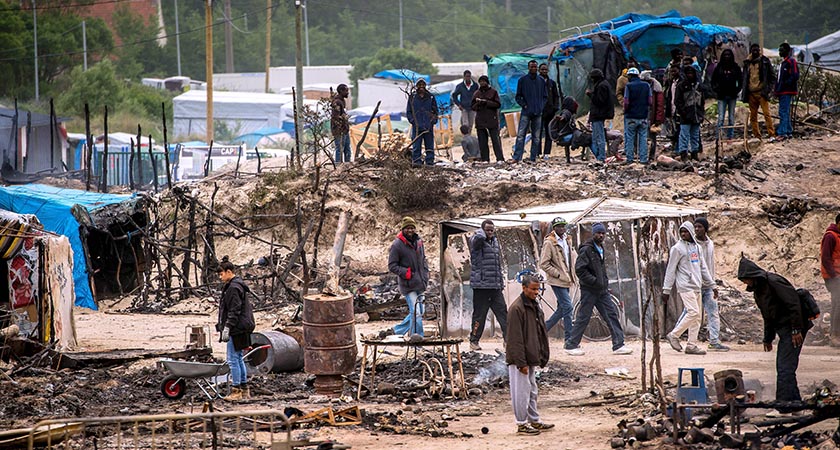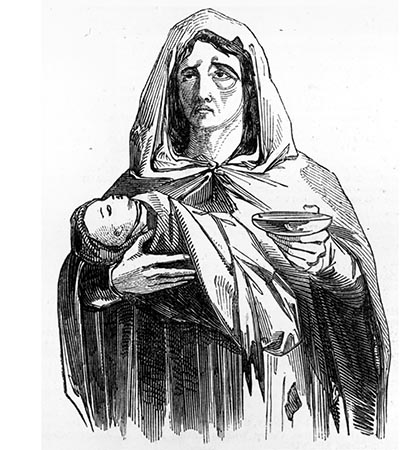AT the recent Mayo versus London football match in West London, an RTÉ reporter stopped some of the Irish GAA fans on their way into the match to ask how they would vote in the upcoming in/out EU referendum.
(Just in case you haven’t heard, the big Brexit referendum happens Thursday, 23 June and British and Irish and citizens over 18 who are resident in the UK are eligible to vote.)
One man told the reporter that he moved to England when he was 15 because he “had no choice”. After detailing his own emigration experience, he said he would be voting to leave the EU because Britain is letting too many immigrants in. Or as he put it “work is being taken by thousands and thousands of people crossing over”
When an immigrant say they're voting for a #Brexit to stop people coming over to Britain and taking their jobs... pic.twitter.com/RMD1CMJbEO— Mark Moloney (@MarkMDub) May 30, 2016
The reaction to the clip on social media was one of bewilderment at his short-term memory, but he is by no means alone.
Brexit is kicking up lots of issues and divisions – and the Irish in Britain and their views on non-Irish immigrants is one of them.
Here at The Irish Post, we get plenty (and by that I mean dozens, but not hundreds) of letters and phonecalls from concerned readers echoing this man’s opinion.
Usually it's men who moved here in the 1950s and 1960s who say they don’t want any more foreigners coming to these shores.
On social media (Facebook and to a lesser extent Twitter) the numbers of first or second generation Irish people who want to keep immigrants out, based on their comments, are in the hundreds.
And they raise the same arguments and concerns time and time again.
 Migrants and refugees at the "Jungle" migrant camp in the northern French town of Calais on (PHILIPPE HUGUEN/AFP/Getty Images)
Migrants and refugees at the "Jungle" migrant camp in the northern French town of Calais on (PHILIPPE HUGUEN/AFP/Getty Images)One of the most common is that the people who are coming here, be they in Calais or trying to cross the Mediterranean, aren’t all real refugees or asylum seekers, they are just coming here for a better life. Just like the Irish.
From 1951 to 2001 the Irish were the largest foreign-born group of people in Britain. We came here in our droves, swarms, flocks, whatever you want to call it. And it we’re still at it.
The last UK census from 2011 showed that 407,357 people identified themselves as ‘Irish-born,’ (in 1961 it was 683,000).
The men and women that left Ireland in the 1950s made the same choice I did in 2010.
They left Ireland, not because they were fleeing a brutal dictatorship, not because there were bombs falling on their families from the skies, not because they were persecuted, but because they wanted a better job, a better life, or just because they wanted to get the heck out of Ireland.
We are economic migrants, so arguing (as I have heard many times) that because the people we see in Calais have mobile phones and shoes they should be sent home seems mighty hypocritical.
'Coming over here, taking our jobs'
But what about that GAA supporters argument, the oft-repeated, ‘they come here taking our jobs’.
Well, that’s true. The Office of National Statistics most recent migration data shows that three-quarters of immigrants to the UK are people migrating to work or study.
Approximately 57 per cent (101,000) of all EU immigrants arriving for work-related reasons reported they had a definite job to go to (the rest, 77,000, were looking for work).
What gets me most about the ‘coming here taking our jobs’ is that it's weird, because aren't all these emigrants supposed to be coming here for a cushy life on benefits? So which is it?
A study by UCL published in November 2014 shows European immigrants to the UK have paid more in taxes than they received in benefits, “helping to relieve the fiscal burden on UK-born workers and contributing to the financing of public services."
It continues: “European immigrants who arrived in the UK since 2000 have contributed more than £20bn to UK public finances between 2001 and 2011.
Immigrants who arrived since 2000 were 43% less likely than natives to receive state benefits or tax credits. They were also 7% less likely to live in social housing.
Numbers like these are often ignored, but it's particularly weird to me when Irish people in Britain act sceptical about the positive impact immigrants have, as we often proudly boast about building London, and enriching the culture and economy here.
 A woman with a baby begging at Clonakilty in County Cork during The Great Famine (1845 - 1849). One million people died from starvation and disease and another million fled as emigrants to Britain and North America during the Irish Famine. (Photo by Hulton Archive/Getty Images)
A woman with a baby begging at Clonakilty in County Cork during The Great Famine (1845 - 1849). One million people died from starvation and disease and another million fled as emigrants to Britain and North America during the Irish Famine. (Photo by Hulton Archive/Getty Images)Anti-immigration talk happens at home too. In the back of a taxi in Dublin, I got chatting with the driver about migrants.
He said he didn’t want people from Syria coming to Ireland. I told him I thought that ‘no room at the inn’ stance was odd to me because literally millions of Irish left Ireland for England, America and Australia and I’m one of them.
We expect to be welcomed or granted visas in countries that aren’t ours just because we are fed up of Ireland, can’t get the job we want or just fancy living somewhere with better weather. Syrians are running for their lives.
"Ah yeah", he said, "but we don’t go over to other countries bombing people."
Which leads me to the another strange idea - that all immigrants are terrorists. Again, this strikes me as particularly odd coming from the mouths of the innocent men and women who (because of the IRA’s campaigns to cause fear and chaos in Britain in the 70s and 80s) got abuse or were treated badly over here. As proud Irish people we get very upset when we sense injustice against our own. If you need proof, just mention the Famine.
Somehow, despite all the things we have in common with migrants from other places, some of the Irish in Britain seem to think we are special or different.
I called one regular contributor to the Irish Post letters page to ask him his opinion. He told me that his family upped sticks and moved here for work when he was 14, but he said: “The Irish came here with a purpose, they came to build roads, this lot have nothing to do, it’s a free ride.”
This attitude bugs other Irish people living here too.
Margaret Gibb commented on a story that showed artist illustrations (like the one above right) from the Famine.
She wrote:
I find these pictures so sad. My ancestors left Ireland in 1860 obviously because of the potato famine as they were farmers. They came over to Scotland and lived a hard life in Leith.
I think we all need to remember when we look at the migrants from Syria that most of us are descended from people who fled the land of their birth because of similar circumstances.
Most of these people need our support not our condemnation.”
Commenting on a separate story Karl wrote: “Irish people are wonderful, aren't we? We totally expect to be given a welcome with open arms by the rest of the world, but the second we might be expected to show any such tolerance or open-mindedness in return.... How quick we are to show our true colours.”
Finally, let's briefly mention one other popular argument – that we need to fix our own problems before allowing others in. Do we really think that without the unwanted immigrants we will suddenly solve homelessness, the housing ‘crisis’, crime and overcrowding in hospitals? Come on.
We’re a nation of emigrants, and there’s nothing wrong with that. Time to cut our fellow immigrants some slack.

